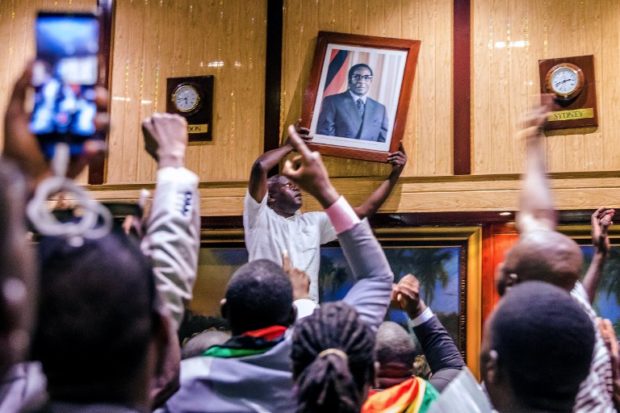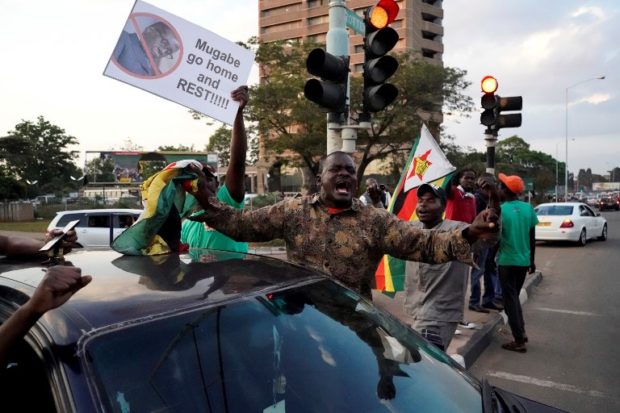Zimbabwe awaits new leader after Mugabe’s shock exit

People remove, from the wall at the International Conference center, where parliament had their sitting, the portrait of former Zimbabwean President Robert Mugabe after his resignation on November 21, 2017 in Harare. / AFP PHOTO / Jekesai NJIKIZANA
Zimbabweans waited Wednesday to discover when their new leader would be appointed after president Robert Mugabe’s resignation brought a sudden end to a 37-year reign of authoritarian rule.
Mugabe’s tenure ended in an announcement at a special joint session of parliament where MPs had convened to impeach the 93-year-old who dominated every aspect of Zimbabwean public life for decades.
On the streets, the news that his long and often brutal leadership was over sparked wild celebrations on Tuesday evening. Car horns honked and large crowds erupted into ecstatic cheers and dancing.
The likely next president is Emmerson Mnangagwa, who Mugabe sacked as his deputy earlier this month in a move that pushed infuriated army chiefs to seize power and force Mugabe’s exit.
Mnangagwa was once a key Mugabe ally, but he was also chief rival of the president’s wife Grace in a bitter succession battle that erupted publicly in recent months.
Article continues after this advertisement“I, Robert Gabriel Mugabe… hereby formally tender my resignation… with immediate effect,” said the letter which was read out by parliamentary speaker Jacob Mudenda.
Article continues after this advertisement“My decision to resign is voluntary,” he said, speaking of his “concern for the welfare of the people of Zimbabwe and my desire to ensure a smooth, peaceful and non-violent transfer of power.”
Huge protests
A man removed a portrait of Mugabe from a room inside the conference center where MPs had assembled for the extraordinary session to impeach the defiant president.
Another bystander replaced it with an image of Mnangagwa, who critics accuse of being a ruthless hardliner guilty overseeing years of state-sponsored violence.
The ruling ZANU-PF party said Mnangagwa, who fled Zimbabwe after his sacking, could swiftly be named interim president as the country charts a way through the turbulence.
“Mnangagwa… will come back in the next 24 hours or so and he will be the one who will be sworn in to be (interim) president for 90 days,” said party spokesman Simon Khaya Moyo on Tuesday.
The resignation capped a week in which the military seized control and tens of thousands of ordinary Zimbabweans took to the streets in an unprecedented show of dissent against Mugabe.
“I am so happy that Mugabe is gone, 37 years under dictatorship is not a joke. I am hoping for a new Zimbabwe ruled by the people,” Tinashe Chakanetsa, 18, told AFP.

People celebrate in the streets after the resignation of Zimbabwe’s president Robert Mugabe on November 21, 2017 in Harare.
Car horns blared and cheering crowds raced through the streets of the Zimbabwean capital Harare as news spread that President Robert Mugabe, 93, had resigned after 37 years in power. / AFP PHOTO / Marco LONGARI
As the news began to sink in, crowds gathered brandishing national flags and often praising army chief General Constantino Chiwenga who led the military’s power-grab.
Mugabe had ruled Zimbabwe almost unopposed since independence in 1980 — but efforts to position Grace Mugabe, 52, as his successor prompted intervention from the military that underpinned his regime.
His monolithic grip was shattered last week when armored military vehicles took to the streets, blockaded parliament and soldiers placed him under house arrest.
Army appeals for calm
The operation had all the hallmarks of a coup, but the generals stopped short of forcing him out.
As the crisis grew, the ZANU-PF party, an instrument of Mugabe’s brutal decades in power, removed him as party leader and began parliamentary proceedings to have him impeached.
“When he saw the turnout (of lawmakers), he probably realised he’d better jump before he was pushed,” said Derek Matyszak, an analyst at the Pretoria-based Institute for Security Studies.
Following Mugabe’s stunning departure, army chief Chiwenga called for Zimbabweans to “exercise maximum restraint and observe law and order to the fullest.”
British Prime Minister Theresa May said the resignation gave Zimbabwe “an opportunity to forge a new path free of the oppression that characterized (Mugabe’s) rule.”
The European Union’s diplomatic chief Federica Mogherini called for a solution that “respects the aspirations of the people of Zimbabwe for a more prosperous and democratic future.”
The US embassy in Harare described it as a historic moment for the country.
Most Zimbabweans have only known life under Mugabe, whose time in power was defined by violent suppression, economic collapse and international isolation.